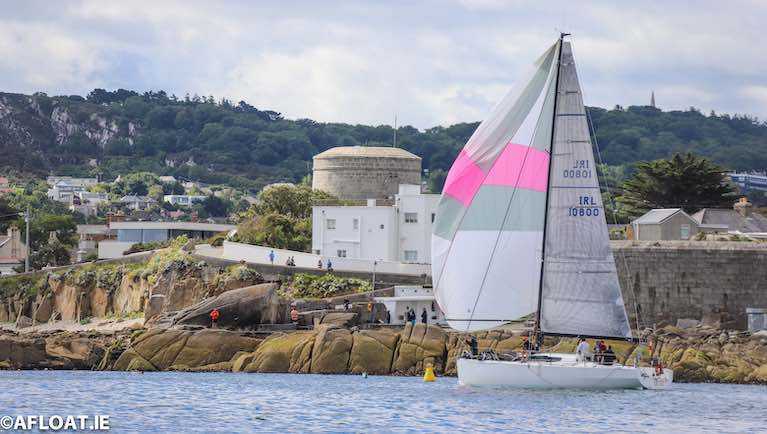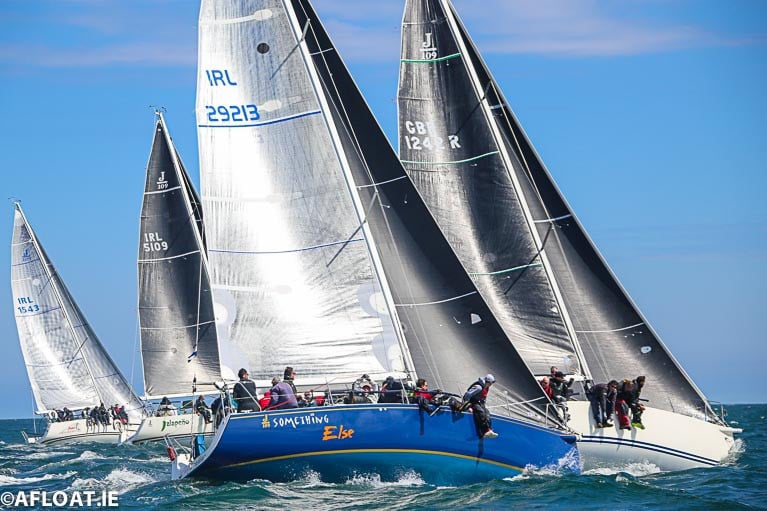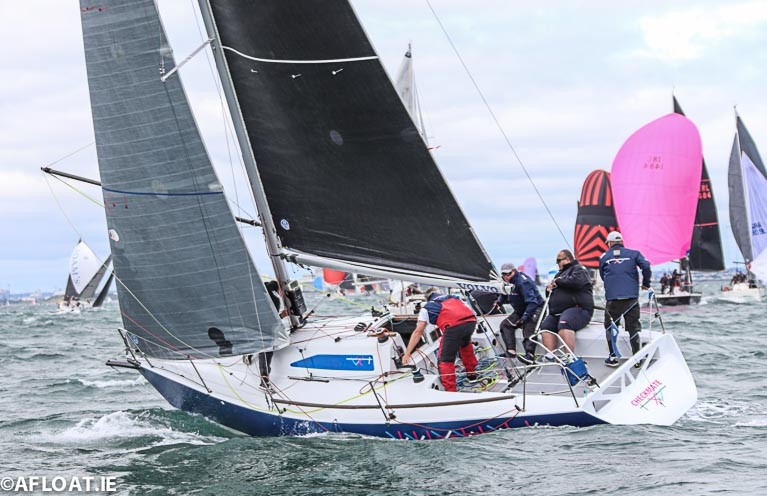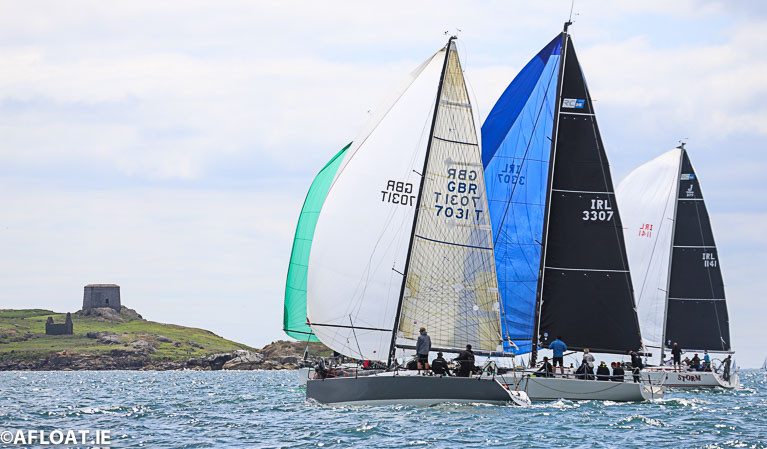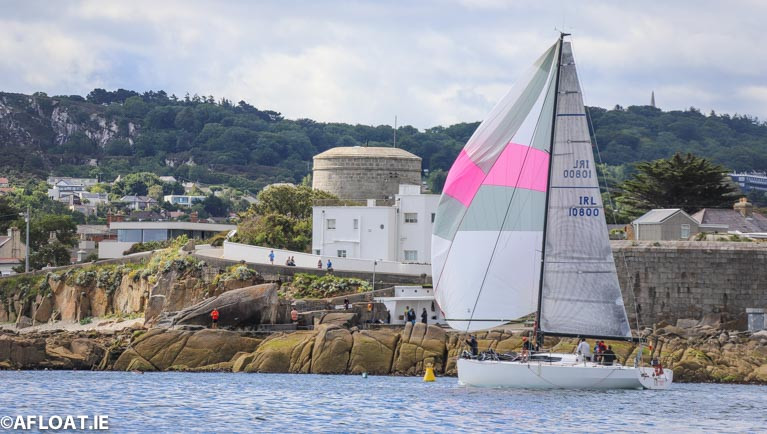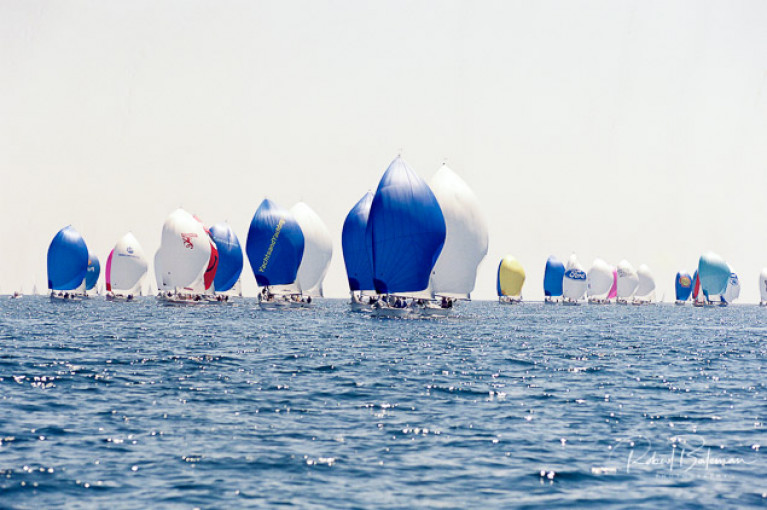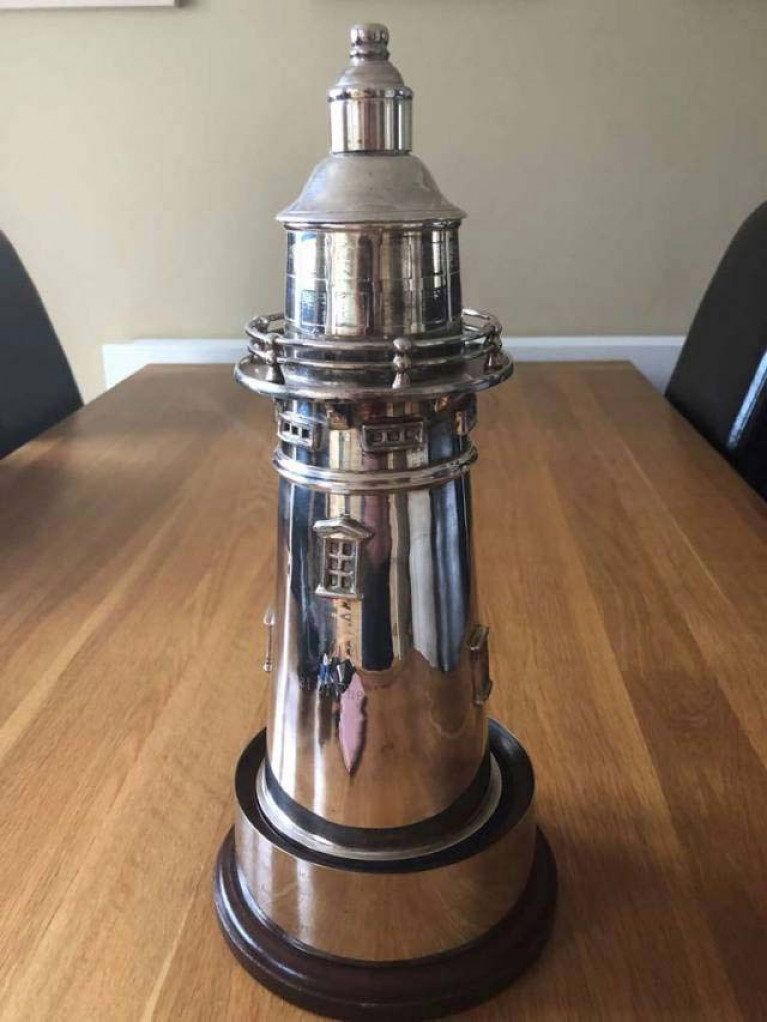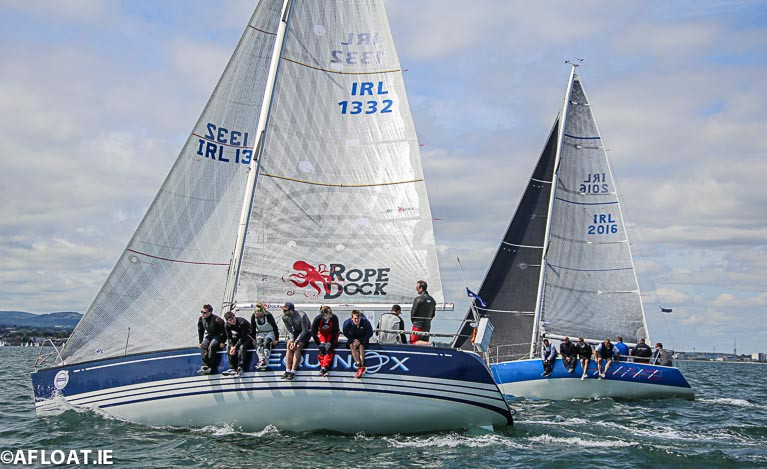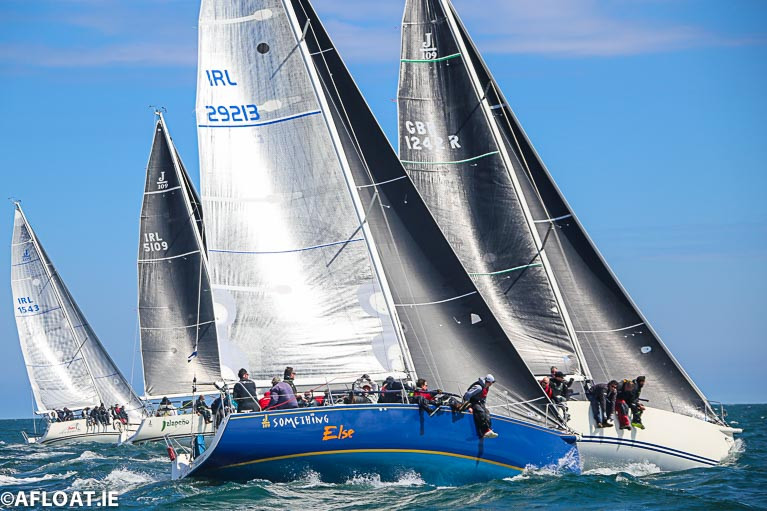Displaying items by tag: ICRA
ICRA Will Not Award Its Boat of the Year Prize in 2020
With the loss of the key cruiser-racer events in 2020 Irish Cruiser Racing Association (ICRA) Commodore Richard Colwell says the association is unable to award its annual Boat of the Year prize.
As well as its own ICRA National Championships, June's Round Ireland Race, July's Cork Week, September's Wave Regatta and WIORA in Tralee were among some of the big casualties in the Irish sailing scene due to COVID.
ICRA is expected to a new schedule of events for its Boat of the Year Award early in 2021 even though the body has already made a pre-emptive move and rescheduled its 2021 National Championships from May to September as Afloat reported here.
"Hopefully, 2021 will shape up to be a normal season, albeit a "new normal", Colwell says.
ICRA Moves 2021 Cruiser Racer National Championships Out From May to September
After cancelling its 2020 championships twice, the Irish Cruiser Racing Association (ICRA) has now seen fit to move the dates of its 2021 National Championships from May to September next year because of the continuing threat of COVID-19.
In a statement issued this afternoon, Commodore Richard Colwell, said "It is now evident that the continued impact of Covid-19 will be felt well into 2021. With that in mind, ICRA was conscious of a need to provide as much time as possible to try and ensure that a National Championship does take place in 2021".
As such, ICRA says it has worked with Dun Laoghaire Harbour's National Yacht Club, the 2021 hosts of the event, to rearrange the National Championship dates from its original date in late May, to an alternative date in early September 2021.
The change also removes an unfortunate clash with the Scottish Series that occurred with the former date, as Afloat reported here.
The new dates for next year's ICRA National Championships are September 3rd - 5th 2021.
In 2020, it was originally planned to race the ICRA Nationals as part of Cork Week and RCYC's 300th celebrations and when that July date was cancelled, ICRA opted to race as part of Septembers' rescheduled Wave Regatta which in turn was axed at Howth also due to COVID leaving the championships not sailed for the first time in its 18-year-history.
ICRA National Championships Will Not Be Sailed in 2020
ICRA Commodore Richard Colwell on the cancellation of the 2020 Championships planned as part of Wave Regatta 2020
It is with a heavy heart that we announce that Howth YC and Fingal County Council have taken the unenviable decision to cancel Wave Regatta 2020 due to the concerns over COVID 19 precautions. ICRA has been involved in these discussions which have explored all possibilities to keep the event alive in some format and we fully support their decision. It means that, at this stage of the season, the ICRA National Championships will not now proceed in 2020.
In discussions with HYC and the main sponsor Fingal County Council, it is clear that due to the current increase in cases and the fact that we have been held at phase 3 for the foreseeable future, the event could not go ahead safely so we fully endorse this decision made on public health grounds. It recently clear that with the numbers involved we simply can’t justify running the event and maintaining social distancing required under the current restrictions.
This is obviously not the news that any of us on the ICRA committee, as avid cruiser racers wanted to hear, as we would all love to get back to what we love and hosting National cruiser racing events.
Having said that, our first and foremost concern has to be the health and safety of all involved in any event.
ICRA will continue to do all we can to support and encourage club cruiser racing for the rest of the year, as well as continuing to support the development of the Under 25 programme and ratings platform development.
We will now work hard on plans for next year's event - at which stage hopefully we will all have learnt how to deal with the virus better and be in a position to back fully to cruiser racing and again run national events.
ICRA Announce Discounts for Cert Fees
The Irish Cruiser Racing Association (ICRA) has today announced that it will provide funding to encourage cruiser racing participation, in the form of discounts to help cover the costs of reducing ECHO and IRC certs from the 1st August.
Conscious that yacht owners are only now starting to get back on the water, for what will be truncated season, ICRA has worked with Irish Sailing and RORC, to provide funding for discounted certs, in order to do what it can to encourage boats to take out certs and take part in racing events.
ICRA says it receives all of its funding through Irish Sailing, from a ring-fenced proportion of cruiser cert fees, after RORC and administration costs are removed.
So far this year ICRA has also allocated and funded close to €10,000 supporting the continued development of under 25 team participation in clubs across the country.
This has come in the form of capital grants, trickle grants for teams already set up, and coaching. They also provide regional support grants, in order to help support cruiser racing across Ireland, which is paid to WIORA and SCORA. The funds also help ICRA to manage and deliver a successful National Championships each year and provide support and development of ratings systems and results.
The once-off COVID 19 cert discounts will allow for yachts to avail of an ECHO cert from the 1st August ongoing to the end of 2020, for less than half the current price, at just €20 per cert.
ICRA has also arranged to provide a 20% discount off any IRC cert purchased between the 1st of August and the 1st September. While they have also confirmed with RORC, that from the 1st of September boats will be able to avail of half-price IRC certs.
However, owners should bear in mind that the turnaround time for standard IRC certs from Irish Sailing is 2-3 weeks, and while every effort will be made to turnaround certs as quickly as possible, this may well be too tight to have your cert 5 days before Wave/ICRA Nationals starts unless an expedited service is paid for.
ICRA hope these discounts, funded as a once-off for 2020 as a response to COVID 19, will help to encourage boats to take out certs and enter open events being staged from now until the end of the season.
In particular, ICRA is keen to encourage boats to have certs in order to be in with a chance to compete for the number of ICRA National Championship titles up for grabs in Corinthian/White Sail, ECHO and IRC classes, at the Wave Regatta from the 11th-13th Sep – with great racing planned for all levels and experience. A very strong entry for the ICRA National Championship 2020 / Wave Regatta is already in, and we would encourage all boat owners to enter what promises to be the highlight of the shortened season.
Richard Colwell, ICRA Commodore, “We don’t have huge budgets at ICRA, as I am sure most are aware, and these are provided by those taking out their certs each year.
However, at our recent committee meeting their was unanimous support to try and do what we can to encourage as many boats to go racing as possible. Driving participation in our sport at all levels remains our core mission.”
ICRA understand that many boats have already applied and paid for certs, and we would like to thank these cruiser-racer owners for continuing to be active participants and supporters of the wider the sport. We had to make a call to apply this discount from a point in time, and unfortunately, discounts can’t be backdated, but we hope this small funding gesture helps to encourage as many yachts as possible to take part in racing for the remainder of 2020.
ICRA Encourages Strong Resurgence of Irish Yacht Racing
While sailing might have been late starting, there is plenty more planned in 2020 writes ICRA Commodore Richard Colwell
After a long winter and a shut down due to COVID 19, that at one point threatened the whole sailing season, the ICRA Committee is delighted to see cruiser racing start again in clubs across the country.
Of course, it’s important that this is done within the guidelines set out by Irish Sailing and Sport Ireland so that as sailors, we remain safe and limit the possibility that our sport is impacted by or contributes to any resurgence of Covid19. To this end, we encourage the cruiser racing fraternity to familiarise themselves with the current COVID 19 regulations, follow the advice from clubs and Irish Sailing, and do our part in keeping the sport safe. Irish Sailing has produced extensive guidelines for running events which we should be helpful to anyone organising an event. Details are here
 Yacht racing leagues have returned to Cork Harbour Photo: Bob Bateman
Yacht racing leagues have returned to Cork Harbour Photo: Bob Bateman
It is great in this context to see life return to clubs across the country, with many yachts being launched in recent weeks and many more being readied. We are delighted to also see that a large number of yachts have already taken out their ECHO and IRC certificates in readiness for events that are being planned nationwide.
As you know, we were disappointed to have to cancel the ICRA National Championships originally planned to be held in tandem with Cork Week 300. However, our decision to ensure the event would take place by partnering with Howth Yacht Club’s Wave Regatta, rescheduled to 11th -13th September, means crews have time to get their boats up to speed in local racing before the National Championships take place. Details and online entry here
We already have a very strong entry for the ICRA National Championship 2020 / Wave Regatta and we would encourage all boat owners to enter what promises to be the highlight of the shortened season. We will have a number of National Championship titles up for grabs in Corinthian/White Sail, ECHO and IRC classes – with great racing planned for all levels and experience also in collaboration with ISORA.
 ISORA and DBSC racing got underway this month on Dublin Bay Photo: Afloat
ISORA and DBSC racing got underway this month on Dublin Bay Photo: Afloat
An extensive offshore sailing re-boot programme has been organised by ISORA with Peter Ryan, ICRA Committee member instrumental in its set up. A strong fleet has already taken part in its first two races with plenty more opportunities for boats to enjoy offshore racing and ensure they have suitable qualifications for the Round Ireland Race planned for later in August. Details of both are found here at www.isora.org and www.roundireland.ie
Despite the COVID 19 Lockdown, the ICRA K25 support programme has successfully started this year with a number of brand new under 25 teams set up in Sligo Yacht Club, Mullaghmore Sailing Club and Malahide Sailing Club, all with the support of ICRA grants. Many teams already in place have applied for and have received funding for continuing to run their teams and there will be plenty of opportunities for more teams to apply and take part next year.
Dublin Bay Sailing Club has also extended its season into October whilst the various regional Autumn Leagues now look to be bigger events than before.
Whilst we might have been late starting, there is plenty more sailing planned for the remainder of what looks like a longer season.
Some Insurers Would Put a Stop to Inter-Club Yacht Racing
“You will notice that the premium has increased on last year. This is not something that is particular to just your policy. All clients have seen their premiums increase this year.”
The warning letter from my insurance brokers was blunt and clear.
The first paragraph of their letter was followed by: “The reason for the increase is that the last few years, 2017 in particular, have seen some very significant disruption in the marine insurance market with successive years of severe losses coupled with premium income failing to meet the rising cost of claims. This resulted in some underwriters withdrawing from the marine sector altogether. With a hardening and contracting market industry, bulletins point to predictable increases in premiums, while the highest risk (perceived or otherwise) cases may find it difficult to arrange cover or will be faced with restricted terms and higher excesses. There have been a couple of claims–free cases where Insurers have declined to offer renewal terms at all.”
Racing boat owners are facing hikes for insurance, some of which could be substantial, added to which there are restrictions appearing in policies which could affect activities such as inter-club racing.
For example, one company – Amlin – would only insure for racing in leagues or regattas organised by one’s own club. In Cork Harbour that would prevent me racing Scribbler, my Sigma 33, in some of the combined league races, because the harbour clubs alternate running them. It would also block participation in the Cobh-Blackrock Race to other than Cove S.C. members, the organising club. Another company, Beazley, wanted the boat ashore after the end of September, which would exclude the Autumn League at the RCYC, the biggest of the season. I was told by my broker that in Ireland there were those who would not insure a Sigma. I was told: “For whatever reason, the underwriters have decided they do not want to insure them, they do not provide any further explanation.”
I checked with a few clubs about insurance changes. Some owners had experienced similar attempts to insert limiting conditions previously, such as no inter-club racing. had resisted them individually and that the changes had not been proceeded with.
Well, those conditions are back again it seems and, so far, there’s no indication that companies which want to get more money from boat owners are prepared to change their minds.
Limiting racing to one’s own club would affect boats taking part in inter-club regattas and other events and what about Championships?
I was told that “rather than bundling all racing into one category there is a move by insurance companies to differentiate between those that race in club races only as those boats are deemed to be “less competitive.”
To change the conditions and get coverage for inter-club racing and cover to the end of October involves substantial premium increases for my boat. To include inter-club racing Amlin wanted €193 more than a premium for one’s own club racing only.
Beazley’s hike for October cover was €58 onto the original quote. Both companies inserted petty massive increases in the excess on a policy.
For club committees, one club Secretary told me, it will make the Notice of Race even more important. Sailing Instructions require that competitors need to have insurance but, does everyone read the small print of their insurance agreement to make sure that they are covered for racing outside of their own clubs and is this something clubs will have to be aware of.
It seems the warning for “buyer beware” is very appropriate for racing yacht insurance this year.
This week’s Podcast below
ICRA's Boat of the Year Award for 2020 to be 'Kept Under Review'
Last week's high-powered ICRA executive meeting took the decision to cancel its original Boat of the Year schedule faced with material changes to the sailing season over COVID-19.
'Once we get clarity on what events will be proceeding, we will reissue a revised Notice of Race', ICRA Committee member Dave Cullen told Afloat.
The original aim was to ensure all boats have an equal chance at winning the trophy it would be based on each boats best four results across events specified in the NOR.
As regular Afloat readers will know, the original NOR schedule published in December 2019 started with the then ICRA Nationals being hosted by Cork Week in 2020. West Cork's Calves Week was added to the BOTY schedule in order to balance WAVE Regatta on the east coast. At approximately 180 miles, the return of the Dún Laoghaire to Cóbh race, feeding into Cork Week, was also recognised by ICRA as a national event for the purposes of its boat of the year award but now, sadly, that plan has all had to be scrapped.
The cruiser-racer body revamped its boat of the year award in 2019 to be formula-based rather than a traditional committee decision.
Last week's ICRA executive also voted to move this year's national championships to race as part of WAVE Regatta this September after the cancellation of Cork Week 2020.
Following the cancellation of Cork Week 300, ICRA has decided to combine the National Championships with this year’s WAVE regatta which will take place at Howth Yacht Club from September 11-13th.
The decision was taken by unanimous vote by all the cruiser-racer representative Board Members at a strongly attended ICRA (remote) meeting this week, with the full support and backing of the RCYC Cork Week team.
The decision took into account a number of factors, including the desire to ensure that the event took place if at all possible and was not cancelled again, the costs and implications of running a standalone event at this stage and the understanding of ensuring boats and crews had some possible opportunity to get up to speed before the event.
The meeting chaired by Commodore Richard Colwell included Cxema Pico, RIYC; David Cullen, HYC; John Leech, LDYC; Ric Morris, RIYC; Johanna Murphy, GISC & SCORA; Peter Ryan, NYC; Denis Byrne, RCYC; Liam Lynch, TBSC. Brian Raftery of SBSC was absent.
The ICRA Committee also say they wish 'to thank generous offers from other clubs to host the regatta on alternate dates'.
 ICRA Commodore Richard Colwell
ICRA Commodore Richard Colwell
Commodore Richard Colwell commented “The ICRA Committee is saddened that the efforts of Cork Week cannot come to fruition so we have considered several alternative options for our annual ICRA National Championships. It was agreed that it would be prudent in the current environment, to delay the important National Championship regatta until as late as possible to try and ensure it goes ahead this year, so we have taken up the offer from Howth Yacht Club to combine the event with the WAVE regatta in September.”
"it would be prudent in the current environment, to delay the important National Championship regatta until as late as possible"
WAVE Chairman, Brian Turvey added “Our team in Howth is delighted to be able to lend support to ICRA for their 2020 Championships. Wave Regatta provides a relatively simple integration for the ICRA Nationals with much of the fleet already intending to compete and at a time of the year which suits many classes for their annual championships, not least that we are hopeful that the pandemic will have abated by then.”
Due to the uncertainty of which events will proceed, it has also been decided to cancel the original Boat of the Year schedule of races and keep under review.
Once we get clarity on what events will be proceeding, we will reissue a revised Notice of Race, ICRA spokesman Dave Cullen said.
Irish boats do not now have to choose between the Irish Cruiser Racing Association (ICRA) national championships or IRC European championships thanks to an integration announced at last weekend’s ICRA conference. Details of this are contained in David O'Brien's Sailing report in today's Irish Times newspaper here.
The news has been welcomed by ICRA for a couple of reasons because Several Class 0 and 1 boats who are already equipped to Category 3 were keen not to be excluded from IRC Europeans given there were no upgrading costs for them.
The Irish Times quotes ICRA champion skipper John Maybury who happily endorses the move. "I had intended to do the ICRA nationals only, but this is now a fantastic opportunity to do the IRC Europeans as well", he says.
According to ICRA spokesman Dave Cullen, ICRA was happier to give participants the option of a shorter regatta as the five-day format is a break from the traditional three-day format. It was recognised that almost all boats would be in Cork for the entire week but the break during the week with regard to points harks back to the old Cork Weeks where Wednesday was a lay day. This new format gives participants the option to enjoy the party festival of Cork Week more and enjoy more casually, the Harbour Race on Wednesday which can be regarded as a more fun event and perhaps a cure for some sore heads. The reality that the Harbour Race can at times rely on luck ensures that the prestigious ICRA title comes from the more traditional windward-leeward and round the can format races.
Cullen says ICRA has said it is 'hugely committed' to growing participation of the ECHO fleet with the new format ECHO proving very attractive to participants. This new format should go further to improving the attractiveness of this year’s ICRA Championship for ECHO boats too.
The cruiser-racer body also says that when its national championships are part of another event, there is normally compromise but ICRA feels that 'the solution reached is highly beneficial for all ICRA Sailors and Cork Week participants alike'.
The Irish Cruiser Racing (ICRA) National Championships return to Dublin Bay in 2021 it was confirmed at the weekend.
The National Yacht Club at Dun Laoghaire will host the three-day championships from May 28 to 30th, just a week before the East Pier Club also stages its biennial offshore 2021 Dun Laoghaire to Dingle race.
The announcement was made by ICRA Commodore Richard Colwell at last weekend's annual conference that attracted a turnout of 50 despite the storm warnings.
A fleet of up to 100 boats in four divisions is expected for the championships that last sailed in Dublin Bay in 2019 when hosted by the Royal St. George Yacht Club.
This year the championships are heading for Royal Cork Yacht Club as part of the line up for the Cork Harbour Club's 300th celebrations at Cork Week Regatta.
Meanwhile, Dun Laoghaire Dingle Race Chairman Adam Winkelmann has set the date for the next edition of the D2D as Wednesday 9th, June 2021.


























